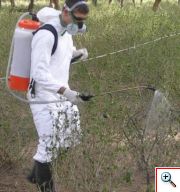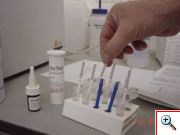The Department conducts research on a wide range of vector biology and vector-borne disease related fields. These range from field based surveillance and control programs to molecular investigations of pathogen and vector genomics. Our research areas fall into the following general categories: Vector Surveillance; Pathogen detection within vector samples; Vector avoidance; Vector control and Basic research.
 |
Vector Surveillance.
|

|
Vector avoidance
|

|
Vector control
|

